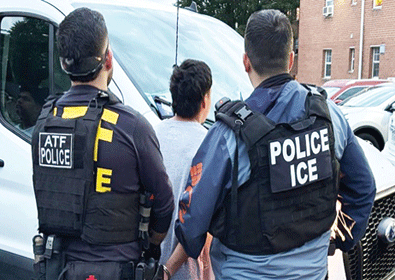▶ For Israel, a Time of Self-Scrutiny
▶ ROGER COHEN
I listened with interest but without feeling challenged. The one subject not addressed was the one most on the minds of congregants: Israel and its recent war in Gaza, with the deaths of more than 70 Israelis and more than 2,100 Palestinians, including about 500 children. Surely I was not alone in hearing words like “fragment” and finding my mind turn to the moral dilemmas of the modern Israeli condition with its power and precariousness, its prosperity and violence, its uncertainty and contaminating dominion. The divine was in those dead Palestinian children, too. They just happened to have lived their brief lives in the hell of encircled Gaza with its tunnels and terrorists and Hamas operatives bent on the destruction of Israel.
Every human instinct recoils from the killing of children. It recoils even as Israel’s right to defend itself from rockets is clear; and the excruciating difficulty of waging war against an enemy deployed among civilians is acknowledged; and the readiness of Israel’s foes to kill any Jew is confronted. However framed, the death of a single child to an Israeli bullet seems to betoken some failure in the longed-for Jewish state, to say nothing of several hundred. The slaughter elsewhere in the Middle East cannot be an alibi for Jews to avoid this self-scrutiny.
Throughout the Diaspora, the millennia of being strangers in strange lands, Jews’ restless search in the scriptures for the ethics contained in sacred words formed a transmission belt of Judaism. For as long as the shared humanity of the other is perceived and felt, such questioning is unavoidable. The terrible thing about the Holy Land today is the denial of this humanity to the stranger. When that goes, so does essential self-interrogation. As mingling has died, separation has bred denial and contempt.
Perhaps I should not have been surprised by the anodyne sermons in London. I had read my colleague Laurie Goodstein’s recent account of the incendiary sensitivity of Israel as subject matter, of the reticence of rabbis, of some feeling “muzzled,” and of the difficulties faced by one New York rabbi, Sharon Kleinbaum, when she read the names of Israeli soldiers and Palestinian children, alike, killed in Gaza. She was accused of spreading Hamas propaganda. No, she was trying, in a small brave way, to keep hearts and minds open.
That is the only way out of the impasse; neither people is going away. It is 67 years since the United Nations called for the establishment of two states, one Jewish, one Arab, in Mandate Palestine; 47 years since the Israeli occupation of the West Bank began; 42 days since the Gaza war ended. Palestinians have made a profession of failure. But to deny Israel’s share is to opt for delusion.
Of course, sermons are only part of the story. The High Holy Days are days to look inward, to be still. I found my eyes straying to a passage from Stefan Zweig’s “The World of Yesterday” reprinted in the prayer book. It read:
“Only now, since they were swept up like dirt in the streets and heaped together, the bankers from their Berlin palaces and sextons from the synagogues of Orthodox congregations, the philosophy professors from Paris, and Romanian cabbies, the undertaker’s helpers and Nobel prize winners, the concert singers, and hired mourners, the authors and distillers, the haves and the have-nots, the great and the small, the devout and the liberals, the usurers and the sages, the Zionists and the assimilated, the Ashkenazim and the Sephardim, the just and the unjust besides which the confused horde who thought that they had long since eluded the curse, the baptized and the semi-Jews - only now, for the first time in hundreds of years, the Jews were forced into a community of interest to which they had long ceased to be sensitive, the ever-recurring - since Egypt - community of expulsion. But why this fate for them and always for them alone? What was the reason, the sense, the aim of this senseless persecution? They were driven out of lands but without a land to go to.”
Two phrases leapt out: “community of expulsion,” and “driven out of lands but without a land to go to.” The second embodied the necessity of the Jewish state of Israel. But it was inconceivable, at least to me, without awareness of the first. Palestinians have joined the ever-recurring “community of expulsion.” The words of Leviticus are worth repeating for any Jew in or concerned by Israel today: Treat the stranger as yourself, for “you were strangers in the land of Egypt.”
스마터리빙
more [ 건강]
[ 건강]이제 혈관 건강도 챙기자!
[현대해운]우리 눈에 보이지 않기 때문에 혈관 건강을 챙기는 것은 결코 쉽지 않은데요. 여러분은 혈관 건강을 유지하기 위해 어떤 노력을 하시나요?
 [ 건강]
[ 건강]내 몸이 건강해지는 과일궁합
 [ 라이프]
[ 라이프]벌레야 물럿거라! 천연 해충제 만들기
 [ 건강]
[ 건강]혈압 낮추는데 좋은 식품
[현대해운]혈관 건강은 주로 노화가 진행되면서 지켜야 할 문제라고 인식되어 왔습니다. 최근 생활 패턴과 식생활의 변화로 혈관의 노화 진행이 빨라지고
사람·사람들
more
“한국전 정전협정 72주년 기억해야”
한국전쟁 정전협정 체결 72주년을 맞아 남가주 두 지역에서 기념행사가 열린다. 육군협회와 미국 재향군인회가 개최하는 이번 행사는 한국전 참전용…

박흥률 전 국장 북콘서트… 수익금 가정상담소 전달
[노세희 기자]박흥률 전 미주 한국일보 특집기획국장의 뉴스에세이‘니가 기자냐? 나는 기자다!’ 북콘서트가 지난 16일 LA 옥스포드 팔레스 호…
미시즈 코리아 클래식 퀸… “K-미인의 저력 뽐내…
믿기 어려운 동안 외모, 철저한 자기관리, 그리고 긍정적인 마인드로 K-뷰티 시대를 선도하는 새로운 리더가 등장했다. 2024 미시즈 코리아 …
‘코리아 댄스 크리에이터 뮤지컬팀’
LA에서 활동하는 배우, 무용수, 가수, 영상 및 사진 예술가들로 구성된 ‘코리아 댄스 크리에이터 뮤지컬’(KDC 뮤지컬·단장 김은교) 팀이 …
“노래가 좋아서 모여요”
40~60대 한인 음악 애호가들로 구성된 LA 채리티 콰이어가 창립 10주년을 맞아 오는 20일(토) 오후 5시 LA 다운타운 콜번스쿨 내 지…
많이 본 기사
- [트럼프 6개월] ‘더 독해진’ 美우선주의 2.0…적도 동맹도 없다
- [특파원 시선] 정치신인 맘다니의 승리와 친이스라엘 로비단체의 패배
- 머스크, ‘엡스타인 파일’로 위기 몰린 트럼프 공격 재개
- 닷새간 폭우·산사태에 19명 사망·실종…산청에서만 13명 피해
- 보수진영, 별세한 헤리티지재단 창립자 애도 잇따라
- ‘남궁민♥’ 진아름, 마이바흐 타는 사모님.. “나에게 주는 포상”
- ‘파행’ 얼룩진 李정부 첫 내각 청문회… ‘청문보고서’ 충돌 지속
- 美 콜드플레이 콘서트서 ‘불륜’ 들킨 CEO, 사흘 만에 사직
- 금속 목걸이 차고 있다 MRI 빨려 들어간 美남성 결국 사망
- “美, 방문 외국인들에 비자 수수료 250달러 부과할 듯”
- “베선트 재무, 연준의장 해임 말라고 트럼프에 진언”
- ‘둘째 만삭’ 이하늬 美친 D라인.. “충분해 만족해 감사해 행복해”
- 초음속 여객기 부활?… ‘조용한 초음속항공기’ X-59, 활주 테스트
- ‘마가’ 분열에 트럼프-머독 송사까지… ‘엡스타인 의혹’ 일파만파
- [트럼프 6개월] 우크라·중동서 휴전 압박했지만 ‘힘을 통한 평화’에 한계
- 트럼프, ‘이란핵시설 부분파괴’ 보도 나오자 “완전파괴” 재강조
- 김문수 “이승만 있었으면 무기력한 ‘셰셰’ 외교 없었을 것”
- 美정가 뒤흔든 엡스타인 파일…정작 성착취 피해자 고통은 뒷전
- “살아남았지만 앞으로 살아갈 날이 걱정”
- 안세영, 일본오픈 배드민턴 결승 진출…올해 6번째 우승 도전
- 보수 헤리티지재단 창립자 퓰너 별세…韓과도 각별한 인연
- 이시바 정권유지·총리퇴진·정권교체…日선거 이후 시나리오는
- ‘30명 부상’ LA 할리우드 돌진 차량 운전자 총상… “싸움 있었다”
- 이적설 도는 손흥민, 프리시즌 첫 경기 공격P 없이 후반만 소화
- 특검 “통일교 前본부장 일방적 소환연기 요구…출석불응 처리”
- ‘미국 없는 미래’ 대비해 ‘3각 협력’ 강화 나선 영·프·독
- 이정후, 토론토전 3타수 무안타…타율 0.247
- 베트남 하롱베이서 유람선 전복…28명 사망·14명 실종
- 특검, 尹 구속기소 “계엄 통제장치 무력화”…외환죄 추가수사
- 美법안 통과에 날개 단 가상화폐, 시가총액 4조달러 첫 돌파
- 美-브라질 신경전 고조…대법관 비자 취소에 룰라 ‘발끈’
- 베선트 재무 만난 日관세각료 “신뢰 강해져…내주 초 미국 방문”
- 다저스 김혜성, 후반기 첫 경기 2타수 1안타…시즌 타율 0.342
- 집중호우 경남 5명 사망, 4명 실종·심정지…산청 전군민 대피령
1/5지식톡

-
 [AP/IB 내신] 에듀스팟 GPA…
0
[AP/IB 내신] 에듀스팟 GPA…
0웹사이트 : www.eduspot.co.kr 카카오톡 상담하기 : https://pf.kakao.com/_BEQWxb블로그 : https://blog.naver.com/eduspotmain안녕하세요. 서울 압구정에…
-
 찬양팀 & 선교팀
0
찬양팀 & 선교팀
0남가주 멕시코 선교팀 & 찬양팀 에서 도네이션 받습니다 모든 악기 종류,악세사리, 앰프,스피커, 마이크,통기타, 전기기타, 자전거, 스쿠터,모터싸이클,드럼,키보드, 색소폰, 트럼펫, 트롬본, 베이스기타,방송 장비들…
-
 오이지 만드는 법
0
오이지 만드는 법
0안녕하세요, 보통 페르시안 오이는 쉽게 물러서 오이지를 담지 않는데요, 혹시 오이지를 만드시는 분이 계실까요? 지식나눔을 해 주신다면 감사 하겠습니다. ((꾸벅))
-
 미국세무사 시험 준비반 개강합니다
0
미국세무사 시험 준비반 개강합니다
0미국 연방세무사 (IRS Special Enrolled Agent) 시험 준비 재택공부8월12일(화) zoom를 이용한 실시간 화상강의 개강월 수 금 서부시간 저녁 7시부터 8시반까지실시간 화상 강의에 참여가 곤…
-
 한국담배보내드립니다
0
한국담배보내드립니다
0한국담배보내드립니다편의점담배 및 면세담배보내드립니다문의:voicema 카톡입니다
케이타운 1번가
오늘의 1면
오피니언
 민병임 뉴욕지사 논설위원
민병임 뉴욕지사 논설위원[살며, 느끼며] 사람이 사람을 살린다

선천적 복수국적법 개정 강력 촉구해야

취약계층 혜택 깎는 연방정부
 문화 칼럼니스트ㆍYASMA7 대표
문화 칼럼니스트ㆍYASMA7 대표 [한국춘추] 골프와 클래식 음악
 조영헌 / 고려대 역사교육과 교수
조영헌 / 고려대 역사교육과 교수 [역사 속 하루] 서태후의 죽음과 청의 폐막
 이희숙 시인ㆍ수필가
이희숙 시인ㆍ수필가 [금요단상] 궁궐, 그 시간 속으로
 임석훈 / 서울경제 논설위원
임석훈 / 서울경제 논설위원닛산 옷파마 공장
 조윤성 논설위원
조윤성 논설위원‘송무백열’(松茂柏悅)
 이상희 UC 리버사이드 교수 인류학
이상희 UC 리버사이드 교수 인류학 힐링 산책
1/3지사별 뉴스

뉴욕시 일원 ICE 구치소 이민자 500여 명 수감
대부분 범죄 전과 없어뉴욕시 일원 연방이민세관단속국(ICE) 구치소에 무려 500명에 가까운 이민자들이 수감돼 있는 것으로 파악됐다. 연방이민…
미국인 4명 중 3명꼴로“북핵 우려”

한국 대학·대학원생 100명, 워싱턴 온 이유는
한국의 대학 및 대학원생 100명이 최근 워싱턴을 방문했다. 이들은 한국 과학기술정보통신부가 주관하는 한국형 I-Corps(혁신단, Innov…
한국어 등 다국어 성취 담당관 모집

“살아남았지만 앞으로 살아갈 날이 걱정”
“칠십 평생 살면서 이런 물은 처음이여, 처음.”하늘에 구멍이 났나 싶을 정도로 쏟아지던 비가 그친 18일 충남 예산군 하포리 2구. 흙탕물이…
한인 2세 유니스 리(양우아)씨 SC 카운티 수피리어 판사 임명




















































.png)


댓글 안에 당신의 성숙함도 담아 주세요.
'오늘의 한마디'는 기사에 대하여 자신의 생각을 말하고 남의 생각을 들으며 서로 다양한 의견을 나누는 공간입니다. 그러나 간혹 불건전한 내용을 올리시는 분들이 계셔서 건전한 인터넷문화 정착을 위해 아래와 같은 운영원칙을 적용합니다.
자체 모니터링을 통해 아래에 해당하는 내용이 포함된 댓글이 발견되면 예고없이 삭제 조치를 하겠습니다.
불건전한 댓글을 올리거나, 이름에 비속어 및 상대방의 불쾌감을 주는 단어를 사용, 유명인 또는 특정 일반인을 사칭하는 경우 이용에 대한 차단 제재를 받을 수 있습니다. 차단될 경우, 일주일간 댓글을 달수 없게 됩니다.
명예훼손, 개인정보 유출, 욕설 등 법률에 위반되는 댓글은 관계 법령에 의거 민형사상 처벌을 받을 수 있으니 이용에 주의를 부탁드립니다.
Close
x